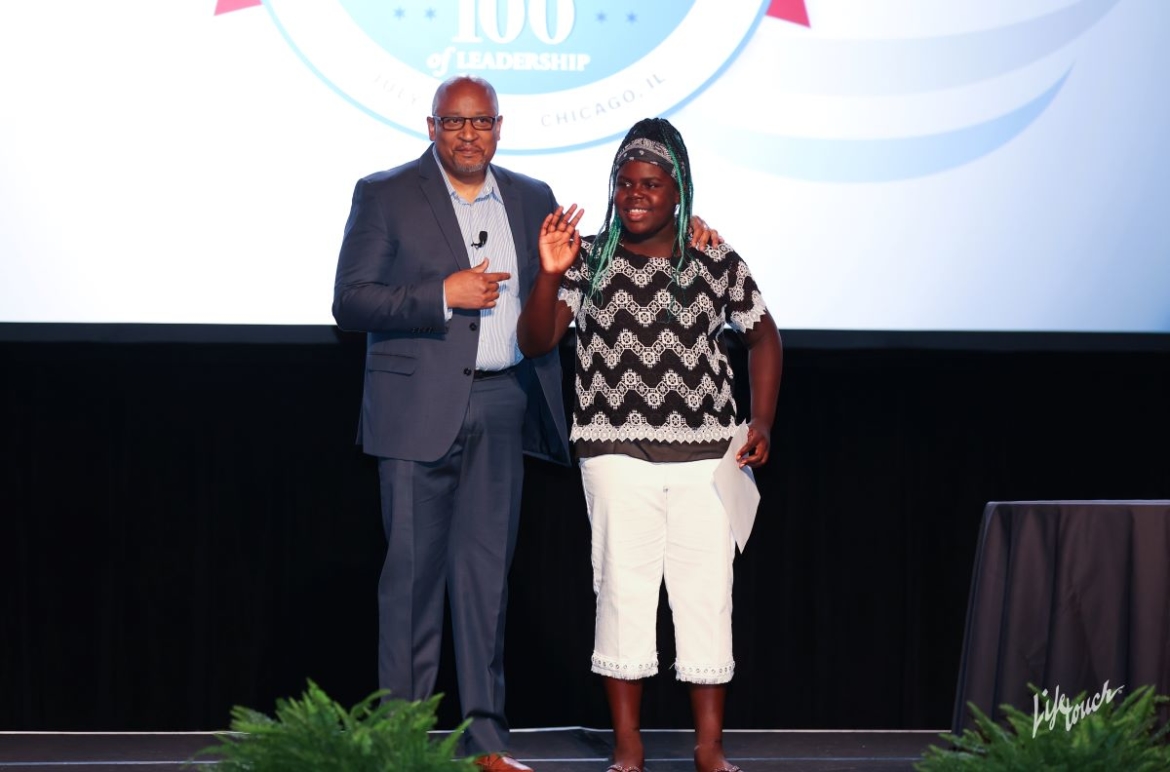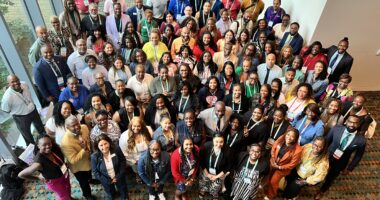Baruti Kafele: Student Success—and Failure—Falls on School Leaders
Baruti Kafele’s keynote message was loud and clear—just one person can alter the trajectory of a student—as he spoke to attendees about their role in student success and failure and knowing their “why.”

After COVID-19 caused a two-year wait to hear this session, principal Baruti Kafele’s opening keynote address for the NAESP Pre-K-8 Principals Conference was the perfect shot in the arm to rejuvenate and re-center leaders on the critical work we do for kids. Kafele’s message that “just one” person can alter the trajectory of a student is one that is grounded in his personal experience as a disenchanted student who was failing—and failed by—the system of school.
Now, a longtime administrator, Kafele shared a big piece of wisdom he’s learned—and its impact wasn’t lost on attendees: Principals are the No. 1 determinant of the success or failure of their students.
While Kafele believes strongly in the moral imperative that each teacher must believe in, get to know, challenge, and have genuine compassion for each student, the focus of his keynote was on the role of a principal in carrying out that charge. He posed a reflection question: “Is my school a better school because I lead it?” In an ever-changing cultural landscape, Kafele urges principals to engage in daily self-reflection, self-assessment, self-adjustment, and self-improvement as a “game film” review of sorts.
Walking in Your Why
That success of our leadership starts with making sure that a principal is “walking in your why:” being “on fire” with the right attitude for students and school community. For many (like me!), this might have been the point in the keynote address where time stopped, begging the need to really pause to think about what that “why” is. It is a question asked at teacher interviews and is not new to educators, but after more than a year filled with less-than-inspiring tasks and managing the constant change of COVID-19 protocols, the chance to regroup and reconsider our purpose is something to re-personalize the hard work once again. In a sense, that “why” provides a backdrop for the “game film” and reflection of how we lived each day as a school leader.
Leading With Passion
Like teachers, principals must be passionate about our students—beyond just names, but knowing what their story is. Stop and get to know students; be a part of their lives. Eat lunch with them, listen, notice, and learn each of their stories. Not only does it show your staff that this matters, but you might be the only one stopping to notice and really seeing a student beyond a grade, attendance record, or a behavior that manifests. Not only must principals be passionate about knowing students, but we also must be passionate about our craft as leaders. Leaders need to actively learn and prepare to bring new ideas, new learning, and to know this passion feeds the energy and changes the trajectory of the school community as a whole.
Ensuring an Equity Mindset
Ensuring classroom equity within the school community is a new and timely element that Kafele brought with him to the keynote stage this year. It is here that principals have the greatest ability to move the needle in leading schools by making sure that we build “equity mindset teaching” in our staff members.
According to Kafele, three classroom equity non-negotiables must be in place:
- Student Individuality: What is seen and what is invisible in our students? Is each student seen as a unique individual (away from compliance and fitting into the group).
- Student Cultural Identity: Are we accentuating the cultural and racial identities? If we continue to be “color blind,” we send a message that students cannot be seen for who they are and the cultural and racial elements that make each unique.
- Student Voice: Do students have a platform to express themselves? Are there structures to help our students find themselves, making that uniqueness distinctive versus learning to be discreet?
Like others, Kafele insists that “equity isn’t a strategy; it’s the only thing,” as it allows us to meet students where they are, understanding that each has their own unique way of learning, their own experiences and realities, and their own way of being motivated and inspired. That is where the true work of teaching and leading comes in as we seek to create schools that give access to each student to be successful and know that they are loved.
As we think of the important work of opening school for the 2021-2022 school year and setting the stage for tremendous academic and social emotional growth in our students, principals must lean into that moral imperative that all eyes are on us. Stop and reflect on your “why,” so that you may notice when you walk in it and when you veer off track. Bring that passion for students and for your school community to every interaction and to the time put in behind the scenes learning and game planning to improve your craft. Plan to teach Kafele’s “equity mindset” to your staff purposefully in the year ahead and capture authentic examples of where you see others living in that mindset throughout your building during the year. In doing so, we can build a critical mass within our school communities and are sure that we live up to the immense responsibility of being the No. 1 determinant of the success or failure of our students.
Jessica Hutchison is principal of Avoca West Elementary School in Glenview, Illinois.




